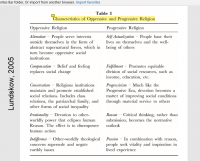Progressive Spirituality
Progressive Spirituality is George Lundskow's term for Authentic Spirituality[1]
Syncretic Terms
Authentic Spirituality > Cosmic Religion, Identity Consistent Spirituality, Mysticism, Perennial Philosophy, Positive Religion, Progressive Spirituality, Pure Religion, Right Path, The Path, The Way, True Path
Notes
First, Lundskow's definition of progressive religion:
What is meant in this context by “progressive” and “reactionary?” Progressive refers to empowerment of the individual, a strengthening of the self in conjunction with community, whereas reactionary refers to submission to perceived superior forces or authority, by which the individual surrenders the self to external authority, and towards which they have no influence. [2]
Note, this definition attempts to attach individual identity, the Bodily Ego, to the community. We gain meaning and purpose by engaging with the community. This, progressive spirituality is to be found in progressive engagement with the community.
Lundskow even offers some "pillars" (he calls them "characteristics") of progressive Religion.
Note the emphasis in Lundskow's characteristic on connecting/attaching with the social. This is a typical Marxist perspective which find meaning and purpose in progressive engagement with the community. He's not wrong here. Authentic Spirituality does lead one towards progressive engagement with the human community, but this engagement comes after realization of our common divininity and essential and deep interconnection. For me, Progressive Community Engagement, expressed in progressive economics, progressive politics, progressive governance, and progressive legal system would be outcome of Connection
Note, Lundskow offers a spirituality devoid of connection, and thus fails to point us in the right direction. For Lundskow, spiritual, though necessary for the salvation of humanity, is nevertheless "invented" by people like Gerald Gardner (paganism) for the purposes of supplying spiritual/humanistic meaning not from personal Connection Experience, as is proper, but from engagement with the community, and the desire to deal psychologically and emotionally with death (very Freudian). You see this emphasis quite clearly in his "characteristics" of progressive spirituality which attach an individual to the social world and not internal monadic consciousness.
Compare Lundskow's characteristics with the LP Seven Pillars of Authentic Spirituality
